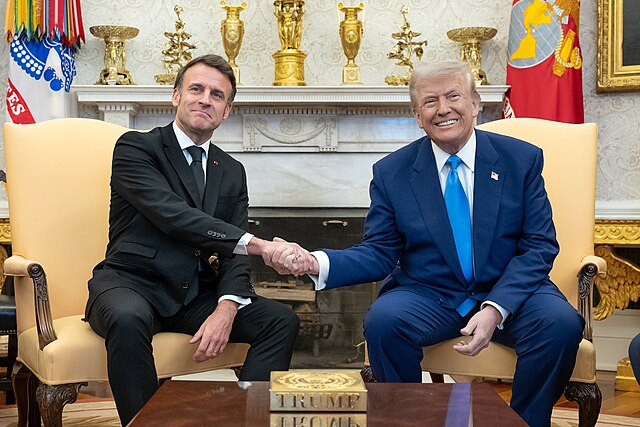President Donald Trump's evolving stance on Ukraine has exacerbated tensions with European allies, with French President Emmanuel Macron publicly urging caution as Trump advances direct talks with Russian President Vladimir Putin. The diplomatic split deepened as the U.S. aligned with Russia and North Korea in key United Nations votes, further isolating Washington from its traditional allies.
During a joint press conference at the White House on Monday, Macron fact-checked Trump in real time, correcting his assertion that European nations were being reimbursed for 60% of the aid sent to Ukraine. "No, in fact, to be frank, we paid. We paid 60% of the total effort: it was through, like the U.S., loans, guarantees, grants," Macron said, placing his hand on Trump's arm. "And we provided real money, to be clear."
Trump, smiling, responded, "If you believe that, it's okay with me."
Macron's visit came as European leaders sought to navigate Trump's shifting Ukraine policy, which has moved away from traditional transatlantic cooperation and toward a direct negotiation with Moscow. In an interview with Fox News on Monday, Macron warned that Trump's approach could have unintended consequences. "I think the arrival of President Trump is a game changer," Macron said. "And I think he has the deterrence capacity of the U.S. to re-engage with Russia ... my concern is that we have to go fast. But we need something first, a truce, which could be assessed, and checked, and full-fledged negotiation."
Trump's push for a settlement with Russia comes as his administration has conditioned future U.S. assistance to Ukraine on economic returns, particularly access to Ukraine's rare earth minerals. The White House has framed the negotiations as an effort to secure American investment returns on wartime aid, a stance that has alienated European allies and drawn scrutiny from within the U.S.
"I mean, that's what I do. I do deals. My whole life is deals," Trump said during the press conference with Macron. "That's all I know, is deals. And I know when somebody wants to make it and when somebody doesn't."
The diplomatic shift was evident at the United Nations, where the U.S. voted alongside Russia and North Korea against a General Assembly resolution condemning Moscow's invasion of Ukraine. The move stunned European allies, who sought amendments emphasizing Ukraine's territorial integrity. When the U.S. later introduced its own resolution calling for a swift peace deal, traditional American allies such as the United Kingdom and France abstained, further exposing the widening transatlantic rift.
British Prime Minister Keir Starmer, speaking in London ahead of a planned White House visit, expressed concerns over Trump's stance. He announced a new set of sanctions against Russia and urged G7 allies to "take on more risk" to weaken the Kremlin. However, Trump has argued that Russia should be reinstated into the G7, a position that contradicts European efforts to isolate Moscow economically.
In Moscow, Putin signaled his openness to Trump's approach, suggesting that the U.S. president was not constrained by Western diplomatic "shackles." He praised Trump's willingness to explore a deal independent of traditional European engagement. Meanwhile, Ukraine has remained wary of Trump's negotiations, particularly given his past demands that Kyiv repay U.S. aid.
Amid the shifting alliances, Macron sought to reinforce European solidarity with Ukraine. He traveled to Kyiv alongside Canadian Prime Minister Justin Trudeau, standing with Ukrainian President Volodymyr Zelensky. Trudeau, who has been on the receiving end of Trump's criticism, was mocked by the U.S. president as the "Governor" of America's supposed "51st state."
Trump has also suggested that Ukraine should consider offering economic incentives as part of a settlement. "I will be meeting with President Zelenskyy. In fact, he may come this week or next week to sign the agreement," Trump said Monday. The deal reportedly involves Ukraine granting the U.S. rights to profits from its rare earth mineral deposits, a move that Kyiv has resisted in the past.
Trump's economic framing of the war has drawn criticism from both Democrats and Republicans. Sen. John Curtis (R., Utah) urged Trump to reconsider his approach, emphasizing the real-world impact of shifting U.S. policy. "If I could say one thing to Elon Musk, it's like, 'Please put a dose of compassion in this,'" Curtis said, referencing Musk's role in government restructuring efforts. "These are real people. These are real lives. These are mortgages."
As Trump seeks a summit with Putin, European leaders are scrambling to ensure that any agreement includes firm security guarantees for Ukraine. Macron and Starmer have both floated the idea of a European-led postwar security force in Ukraine, but concerns remain that Trump may withdraw U.S. backing for such measures. "We want peace; he wants peace," Macron said at the White House. "We want peace swiftly, but we don't want an agreement that is weak."
Despite the diplomatic discord, Trump has continued to frame his approach as a bold break from the past. "This mess will get sorted out this week," he wrote on X. "A lot of people are in for a rude awakening and a strong dose of reality. They don't get it yet, but they will."






